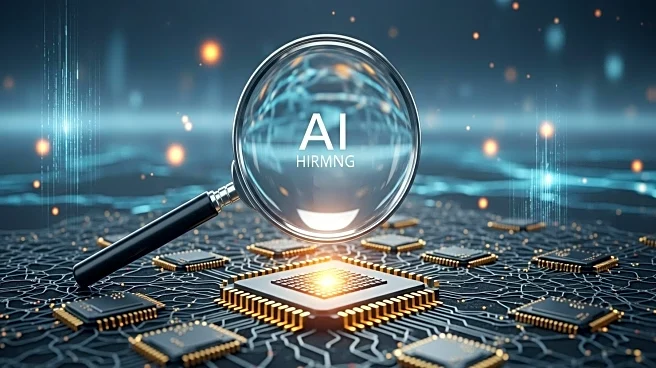What is the story about?
What's Happening?
Investigative journalist Hilke Schellmann has revealed significant flaws in AI hiring tools used by companies for job screening. These tools, designed to streamline the hiring process, have been found to exhibit biases and technical bugs that can disadvantage applicants. Schellmann, an assistant professor of journalism at New York University, has authored a book titled 'The Algorithm: How AI Decides Who Gets Hired, Monitored, Promoted, and Fired, And Why We Need To Fight Back.' Her findings suggest that AI systems, while intended to be impartial, often fail to accurately assess candidates, leading to potential discrimination. Schellmann's work highlights the need for applicants to rethink their resumes and approach to job applications in an era where AI plays a significant role in employment decisions.
Why It's Important?
The use of AI in hiring processes is becoming increasingly prevalent, raising concerns about fairness and accuracy. Schellmann's findings underscore the potential for AI systems to perpetuate biases, which could have serious implications for job seekers, particularly those from marginalized groups. As companies rely more on AI for efficiency, the risk of overlooking qualified candidates due to algorithmic errors or biases increases. This situation calls for a critical examination of AI tools and their impact on employment practices, urging stakeholders to address these issues to ensure equitable hiring processes. The broader significance lies in the need for transparency and accountability in AI systems to prevent discrimination and promote diversity in the workforce.
What's Next?
The revelations about AI hiring tools may prompt companies to reassess their reliance on these technologies and consider implementing measures to mitigate bias. There could be increased pressure from advocacy groups and policymakers to regulate AI in employment settings, ensuring that these tools are fair and transparent. Companies might invest in improving AI algorithms or seek alternative methods for candidate evaluation. Additionally, job seekers may need to adapt their strategies, focusing on skills and experiences that AI systems can accurately assess. The ongoing dialogue about AI ethics and employment practices is likely to intensify, influencing future developments in the field.
Beyond the Headlines
The ethical implications of AI in hiring extend beyond immediate biases, touching on broader issues of privacy and data security. As AI systems analyze vast amounts of personal data, concerns about how this information is stored and used become pertinent. The long-term impact of AI on employment could also reshape job markets, potentially leading to shifts in required skills and workforce dynamics. This development highlights the need for comprehensive policies that address not only bias but also the ethical use of AI in employment.

















